Togo bus attack goalkeeper: 'I'm not afraid of dying any more'
- Published
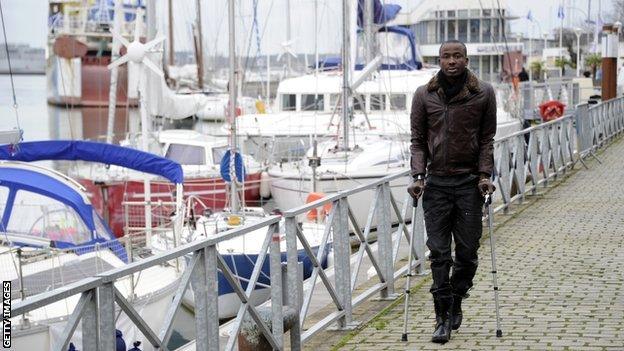
Obilale has had eight operations in the six years since the shooting
Six years ago, on 8 January 2010, Togo goalkeeper Kodjovi Obilale found himself in a sudden death situation.
Not in a penalty shootout, but in a bus, in the dark of night, in the disputed Angolan enclave of Cabinda.
Obilale and his Togo team-mates were en route to the Africa Cup of Nations when the bus was ambushed by armed gunmen.
In a horrific attack that shocked the world of football, three people were killed and seven were injured, including Obilale, who was shot twice.
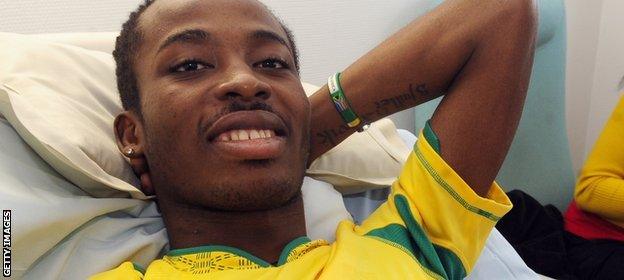
Obilale was flown to hospital in South Africa for surgery
His spine, intestines, liver and bladder were all damaged.
For several hours, it was reported that Obilale, too, had been killed.
But six years, eight operations and countless physiotherapy sessions later, Obilale is very much alive and, miraculously, still kicking.
'My life has changed'
The 31-year-old, who played five times for Togo, is back in the French town of Lorient, Brittany, where he played his club football.
He works as a special needs instructor for Remise en Jeu, an organisation that helps young people with social, mental and physical problems get their life back on track through the medium of football.
"Today, my life has changed," he told me. "Mentally I feel fine and when the mind is OK, the body normally follows suit.
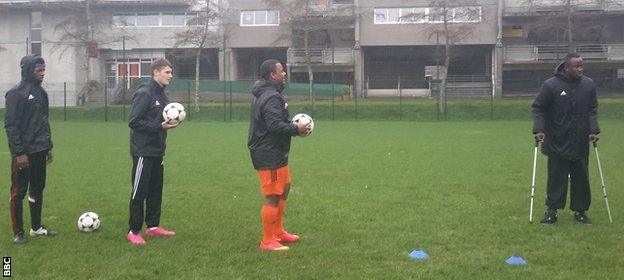
Obilale (far right) still needs crutches but no longer needs a wheelchair
"I'm working and the fact my mind is busy means I can leave lots of things behind and move forward."
These days, Obilale still needs crutches to move forward, but he no longer uses a wheelchair.
He has regained 50% use of his right leg and is even back driving again. His car has been specially adapted with the accelerator on the left.
He uses the crutches to direct his coaching sessions, tapping them furiously to get the attention of the kids he looks after. It's quite a sight.
'I felt there was a connection'
The shooting itself happened a few miles into Cabinda from the border with Congo Brazzaville.
The Togo team were travelling to their training base a few days before their first match of the 2010 Africa Cup of Nations against Ghana.
The ambush was carried out by gunmen from the Front for the Liberation of the Enclave of Cabinda, who were fighting for the independence of the oil-rich enclave from the rest of Angola.
Bus driver Mario Adjoua, assistant manager Abalo Amelete and media officer Stanislas Ocloo were killed.
News of the shooting was broken on BBC World Service and very quickly became a global story.
Obilale says his one abiding memory of that fateful day was when he was in the bus, being spoken to in Portuguese by a young Angolan woman.
"I didn't understand a word she was saying, but deep down I felt there was a connection between us," said Obilale. "She was trying to reassure me.
"By concentrating on her voice and listening to what she was saying, it was as if I understood her. That calmed me down."
The day after the shooting, the Togo team decided it was impossible to take part in the tournament and pulled out.
That angered African football bosses, who decided to ban Togo from the tournament for four years., external
That suspension was subsequently overturned, external following mediation by world governing body Fifa.
The tournament took place without Togo, who were not replaced, and the shooting inevitably cast a significant shadow over the competition.
'They put money before humanity'
Although Obilale has made great progress, the horrors of that fateful night in Cabinda are still fresh, still raw.
He had "dark thoughts, really dark thoughts" when he was in hospital in South Africa.
"I just didn't want to fight any more," he told me.
"Before one of the operations, I said to my brother 'this time, I don't think I'll be coming back. I think I'm going to go'."
In the end, it was the thought of letting down his family, and in particular his two children, that pulled him back from the brink.
"I thought it would be really selfish of me to do something like that," he said. "But I did have dark thoughts.
"If I had been single, with no children, I think the whole struggle would have been different, because I was really, really weak."
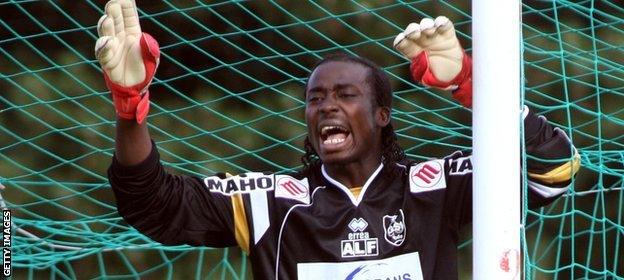
Obilale playing for French amateur side GSI Pontivy
Financially, too, it's been tough.
Fifa reimbursed his medical expenses and there were donations from team-mate Emmanuel Adebayor and good friend Samuel Eto'o.
Even the French Football Federation chipped in. But from CAF, the African federation, there was nothing. Not a dime. And that still hurts.
"For me, the Confederation of African Football didn't do their job properly," said Obilale. "I think there are cases where they put money before humanity and that's very sad."
'I'm not angry with them'
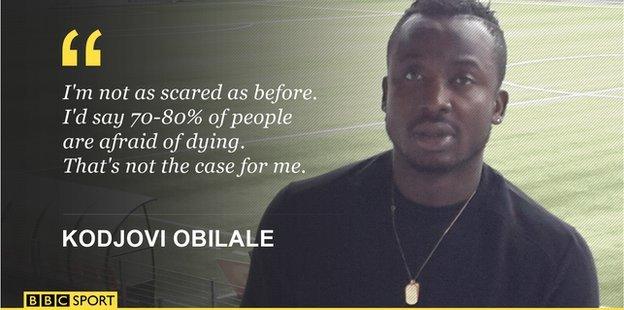
The shooting in Cabinda cost Obilale his career, his relationship with his partner at the time and almost his life.
But his lack of bitterness is truly humbling.
He says he no longer misses playing football and insists he bears no grudges against the gunmen who shot him.
"I'm not angry with them," said Obilale. "It's not worth it.
"Today, we live in a world where some people are prepared to take a life just to get themselves heard and it's got to stop."
Obilale, who was a member of Togo's 2006 World Cup squad, still has pills to take and long nights to get through.
The past six years have changed his life, not just physically and financially, but morally, too. It's changed his outlook on life - and death.
"With everything I've been through, if something's going to happen to me, it'll happen," he said. "I'm not as scared as before.
"I'd say 70-80% of people are afraid of dying. That's not the case for me."
You can listen to an interview with Obilale by visiting World Football on the World Football website.